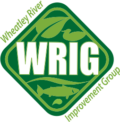Hello Wheatley River watershed members,
Our summer field season is well underway – continue reading to learn about what we’ve been up to.
Tree planting is now complete! Our staff planted a total of 415 native trees and shrubs across 10 different sites within our watershed areas. We also took part in a tree identification, planting, and pruning workshop with Gary Schneider of MacPhail Woods. Their website (www.macphailwoods.org) is a fantastic resource for anyone interested in planting native species for shoreline, wind, and erosion protection, wildlife enhancement, and/or property beautification.
We have also been monitoring the 46 nest boxes that WRIG maintains. We were so excited to see activity in some of the tree swallow and American kestrel boxes that we constructed during the fall and winter, with financial support from the PEI Wildlife Conservation Fund. Nine tree swallow and four American kestrel nests were found!
A large portion of our work as a watershed group is monitoring local water quality. Each week, we sample water quality at 20 different freshwater sites using a YSI meter borrowed from the PEI Watershed Alliance. We’ve also been doing anoxia surveys every three weeks, by canoe from the Wheatley River Bridge to the Oyster Bed Bridge. The Wheatley River has gone anoxic every year since 2011. This year, the river had an anoxic event by July 8th, which is earlier than normal. This trend will continue with climate change, as warm water temperatures support sea lettuce growth. Please contact WRIG if you see any signs of anoxia (milky green or white water and a bad rotten-egg odour). You can also become a citizen scientist to monitor and log conditions in your local estuary. Let us know if you’re interested! Another way we are monitoring water quality is by using temperature loggers, which record the water temperature every hour. Two devices have been deployed near Rackham’s Pond to measure the temperature of the inflow and outflow. Water temperature is a key characteristic of brook trout habitat as they undergo thermal stress when exposed to temperatures above 18°C.
WRIG has also collaborated with the Hunter-Clyde Watershed Group on beach cleanups along the Oyster Bed Bridge estuary and North Rustico beach. Do you know of a shoreline in your community that is polluted with beach litter? The provincial Cleaning Our Shoreline initiative has returned for summer 2021! Student crews have been hired in all three counties and will work closely with the Departments of Fisheries and Communities and Transportation and Infrastructure. Last summer, clean-up crews visited 243 shorelines and gathered 20,300 kilograms of debris for disposal, restoring the beauty, safety, and environmental quality of PEI beaches. Submit shoreline clean up requests directly to the initiative by texting 902-200-2106 and include exact location, beach name, surrounding landmarks and pictures if possible. If you’d like WRIG to submit the request on your behalf, contact us at manager@wheatleyriver.ca or 902-963-3198.
Maggie McConnell
Watershed Manager
Wheatley River Improvement Group
http://wheatleyriver.ca
